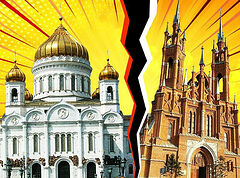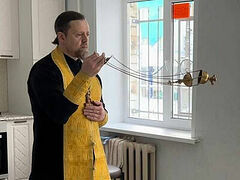Moscow, October 2, 2024
The Russian Orthodox Church is sending the draft document, “On Issues Concerning Prayer with Non-Orthodox Christians,” to its dioceses for feedback. It was also published for discussion on the Parishes website, where anyone who wishes to do so can leave comments.
The draft was composed by the commission of the Inter-Council Presence on Church Law in accordance with the instructions given by the Church hierarchy in 2018.
This document outlines the Russian Church’s stance on prayer and interactions with non-Orthodox Christians. It emphasizes the prohibition of joint prayer and concelebration with heretics or non-Orthodox, based on Apostolic and other canons. The document provides guidelines for various situations, including the presence of non-Orthodox at Orthodox services, Orthodox clergy at non-Orthodox gatherings, and veneration of common Christian shrines.
It allows for mixed marriages under specific conditions and addresses participation in state ceremonies in countries where other confessions dominate. The document stresses the importance of maintaining Orthodox traditions while navigating inter-Christian relations, allowing for some flexibility in certain circumstances but firmly rejecting any practices that might compromise Orthodox faith or lead to the mixing of religious traditions.
Comments are being accepted until December 1.
***
I. The prohibition of common prayer with heretics under the threat of excommunication from Church communion or deposition from clerical rank is contained in a number of Apostolic rules: “If anyone prays with one who is excommunicated from Church communion, even if it is in a house: let such a one be excommunicated” (Ap. 10); “If a bishop, or presbyter, or deacon shall join in prayer with heretics, let him be suspended. But if he permit them to perform any service as clergymen, let him be deposed” (Ap. 45); “We order that a bishop or presbyter who has accepted the Baptism or sacrifice of heretics be deposed. For what accord has Christ with Belial, or what portion does a believer share with an unbeliever” (Ap. 46). The Fathers of the Council of Laodicea in Canon 6 command: “Not to allow heretics who persist in heresy to enter the house of God.” In his rule, St. Timothy of Alexandria clarifies that heretics “should not be present” at the Divine Liturgy “unless they promise to repent and abandon the heresy” (Tim. Al. 9).
II. In the Russian Orthodox Church, concelebration with representatives of other confessions (especially during Eucharistic services) is unacceptable. This also applies to joint communion or intercommunion, which is definitively rejected by the Orthodox Fullness.
III. Church-legal determinations regarding the degree of permissibility of joint prayers with non-Orthodox are contained in a number of documents of the Bishops’ Councils of the Russian Orthodox Church.
The document of the 1994 Bishops’ Council “On the Attitude of the Russian Orthodox Church to Inter-Christian Cooperation in the Search for Unity” emphasizes the need for a separate decision on this issue in each specific case, but this decision should reflect the general theological understanding and established practice: “The question of the expediency or inexpediency of prayers with non-Orthodox Christians during official meetings, secular celebrations, conferences, theological dialogues, negotiations, as well as in other cases is left to the discretion of the Church leadership in general church external activities and to the discretion of diocesan bishops in matters of intra-diocesan life, which is determined by the canonical structure of the Orthodox Church and takes place in the practice of other Local Orthodox Churches.” At the same time, it was deemed necessary “in specific issues of relationships with the non-Orthodox world to recommend to the pastors and laity of our Church to have wisdom and zeal for the Lord, so as not to give cause for confusion and temptation to the faithful of our Church” (paragraphs 7 and 8).
The 2008 Bishops’ Council also stated that “in the process of dialogue, our Church does not accept attempts to ‘mix faiths,’ joint prayer actions that artificially combine confessional or religious traditions”[1]. The documents of the same 2008 Bishops’ Council include an expert opinion of the Synodal Theological Commission of the Russian Orthodox Church, which states:
“The Orthodox Church excludes any possibility of liturgical communion with non-Orthodox. In particular, it is considered unacceptable for Orthodox to participate in liturgical actions associated with so-called ecumenical or interfaith services[2].
It follows that Orthodox visiting Catholic or Protestant churches, being present at non-Orthodox services without explicit or hidden prayer, and Orthodox prayer before common Christian shrines are quite permissible, while public or private prayers with non-Orthodox are unacceptable for Orthodox”[3].
Other Bishops’ Councils, without directly addressing the topic of prayers, indicated as the main task in the field of inter-Christian relations “joint protection of Christian moral values, countering discrimination against Christians and the destruction of the Christian European tradition, as well as developing, as far as possible, a common attitude towards the processes of liberal secularization and globalization”[4].
IV. The following rules, developed by the practice of relations between clergy and laity of the Russian Orthodox Church (including its foreign part[5]) with non-Orthodox Christians, should be adhered to:
-
To what extent, when and where it is permissible to specially invite non-Orthodox to be present at Orthodox services, or how to respond to similar invitations addressed to Orthodox is determined by the Church leadership, based on Church economy, pastoral considerations, concern for the good of the Church, bearing in mind not to cause temptation to the faithful and at the same time not to repel those seeking rapprochement with the Orthodox Church.
-
Respectful presence of non-Orthodox people at Orthodox services is permissible, for, as noted by the 2008 Bishops’ Council, “it was the possibility of visiting the Church of Hagia Sophia that opened the way for Russia to accept Orthodoxy through the ambassadors of Grand Prince Vladimir”[6]. At the same time, concelebration of non-Orthodox clergy in any form is unacceptable. When inviting a non-Orthodox clergyman to a celebration in an Orthodox church, he should be offered to be present in non-liturgical attire. At the same time, the guest should be offered an honorable place away from the serving clergy, so that no one could get the impression that concelebration is taking place. It is unacceptable for an Orthodox clergyman to be present in liturgical vestments at non-Orthodox services.
-
When present at some non-Orthodox gathering, an Orthodox clergyman should stand during the reading of prayers by any of the non-Orthodox, but should not show external signs of participation in this prayer. If at such a gathering an Orthodox priest is asked to bless the meal, he can do so, for he should read a prayer before the meal and bless it for himself personally as well. At meetings of charitable and other organizations with the participation of non-Orthodox, an Orthodox clergyman can read a prayer, while simultaneous (joint) reading of prayers with non-Orthodox is not allowed.
-
“For Orthodox Christians, it has always been permissible to venerate common Christian shrines that are not in Orthodox churches”[7]. For this purpose, Orthodox pilgrims have long visited non-Orthodox, in particular, Roman Catholic churches (for example, the Church of St. Nicholas in Bari, St. Peter’s Basilica in Rome, and many other churches) where shrines of the Ancient Undivided Church are kept. The presence of Orthodox and their veneration of shrines in such churches during services performed there is not considered as participation in joint prayer.
V. The inadmissibility of Eucharistic communion[8] does not exclude the necessity in some cases for clergy and laity of the Russian Orthodox Church to participate in state celebrations or socially significant ceremonies accompanied by prayers in those countries where other confessions are dominant. However, even in these cases, Orthodox Christians should not allow simultaneous (joint) reading of prayers with non-Orthodox or, moreover, participation in joint liturgical rites.
VI. The blessing of a mixed marriage is allowed[9] on the indispensable condition that the non-Orthodox party gives a written promise to baptize children born in such a marriage in the Orthodox Church and not to hinder their Orthodox upbringing.
“The Russian Orthodox Church, both in the past and today, finds it possible to perform marriages of Orthodox Christians with Catholics, members of Ancient Eastern Churches and Protestants who profess faith in the Triune God, provided that the marriage is blessed in the Orthodox Church and children are raised in the Orthodox faith. The same practice has been followed by most Orthodox Churches over the past centuries”[10]. The participation of a non-Orthodox Christian in the marriage ceremony in the case of such a marriage is implied by the very rite of the Sacrament.
When performing the Sacrament of Marriage, it is unacceptable for a non-Orthodox clergyman to give a blessing to those being married in an Orthodox church, as well as the presence of a non-Orthodox cleric in liturgical vestments during the celebration of the Sacrament.
VII. Non-Orthodox should not be allowed to be Godparents for persons being baptized in the Orthodox Church, since the duties of Godparents include raising their Godchildren in the Orthodox faith.
***
[1] Resolution of the Holy Bishops’ Council of the Russian Orthodox Church of June 24-29, 2008 “On Issues of Internal Life and External Activities of the Russian Orthodox Church,” paragraph 36.
[2] This norm was previously included in the document “On the Attitude of the Orthodox Church to Non-Orthodox Confessions and Interfaith Organizations,” adopted at a joint meeting of the Moscow Patriarchate Commission for Dialogue with the Russian Church Abroad and the Russian Church Abroad Commission for Negotiations with the Moscow Patriarchate and approved by decisions of the Holy Synod of the Russian Orthodox Church (April 20, 2005) and the Synod of Bishops of the Russian Church Abroad (May 23, 2005).
[3] Theological and canonical analysis of letters and appeals signed by His Grace Diomid, Bishop of Anadyr and Chukotka. I. Theological analysis. Inter-Christian and interreligious relations.
[4] Resolution of the Holy Bishops’ Council of the Russian Orthodox Church of 2011 “On Issues of Internal Life and External Activities of the Russian Orthodox Church,” paragraph 48.
[5] See, in particular: Resolution of the Bishops’ Council of the Russian Orthodox Church Outside Russia of September 26, 1974. No. 889 // Legislation of the Russian Orthodox Church Outside Russia (1921-2007). Moscow: PSTGU Publishing House, 2014. pp. 187-188.
[6] Resolution of the Holy Bishops’ Council of the Russian Orthodox Church of 2008 “On Issues of Internal Life and External Activities of the Russian Orthodox Church,” paragraph 36.
[7] Ibid. See also: Epistle of St. Theodore the Studite to the monk Methodius. Question 5.
[8] “The unity of the Church is primarily unity and communion in the Sacraments. But genuine communion in the Sacraments has nothing in common with the practice of so-called ‘intercommunion,’ Unity can only be realized in the identity of gracious experience and life, in the faith of the Church, in the fullness of mysterious life in the Holy Spirit” (Basic Principles of the Attitude of the Russian Orthodox Church to Non-Orthodoxy, 2.12).
[9] The document “On the Canonical Aspects of Church Marriage,” adopted at the Bishops’ Council of the Russian Orthodox Church on November 29 - December 2, 2017, regulates obtaining the blessing of the diocesan bishop for the celebration of such a mixed marriage: “The blessing of the diocesan bishop for entering into such a marriage can be given to the Orthodox party in response to a written petition, which must be accompanied by the consent of the non-Orthodox party that the children will be raised in the Orthodox faith” (On the Canonical Aspects of Church Marriage. III. Marriages with Non-Orthodox Christians).
[10] The Basis of the Social Concept of the Russian Orthodox Church, X.2.
Follow OrthoChristian on Twitter, Vkontakte, Telegram, WhatsApp, MeWe, and Gab!




